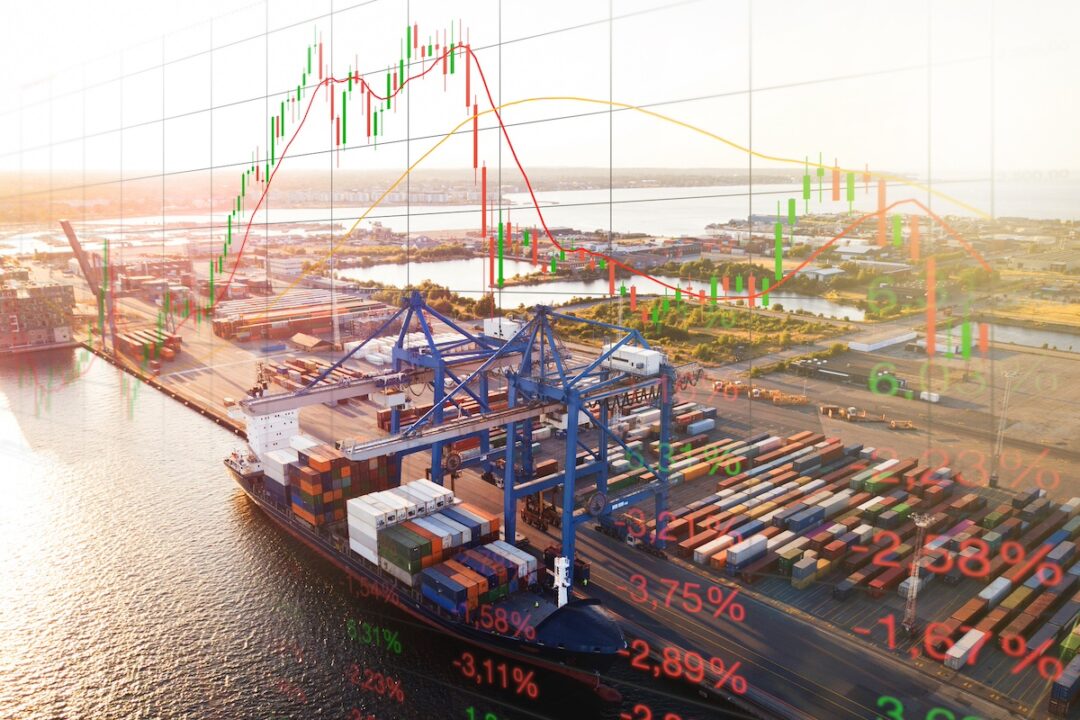
Visit Our Sponsors |
|
|
|
|
|
|
|
|
|
|
|
|
|
|
|
|
|
|
|
|
|
|
|
|
|
|
|
|
|
|
|
|
|
|
|
|
|
|

Photo: iStock / jonathanfilskov-photography
The Trump administration's sweeping tariffs have led to slowdowns at some of the United States' most crucial shipping hubs, brought on by a rapidly rising number of blank sailings, plummeting imports, and growing fears of a potential recession.
According to an April 21 release from freight forwarder Flexport, ocean carriers have been withdrawing capacity for transpacific eastbound trade at faster rates than were seen during the pandemic, with eight carriers having completely suspended seven of their weekly service loops.
"Additionally, more services are blanked for several weeks across alliances/carriers, with further blank sailing announcements expected," Flexport said, noting that blank sailings nearly doubled between the weeks beginning on April 13 and April 20, while more than 25% of weekly service loops have already been canceled for late-April/early-May.
According to shipping data provider Port Optimizer, scheduled vessels for the week of April 27 at the Port of Los Angeles are down by more than 27% compared to the previous week, as well as 9% compared to the same period last year. The Wall Street Journal also reports that the port expects a 35% drop in import volumes over the next two weeks, with executive director Gene Seroka stating in an April 24 briefing that "essentially shipments out of China for major retailers and manufacturers have ceased." Further north at the Ports of Seattle and Tacoma, volumes have been strong to start the year, although vessels have been arriving with less cargo than anticipated in recent weeks.
"We are hearing from exporters and importers directly on cancelled orders, especially with China," said Northwest Seaport Alliance spokesperson Kate Nolan. "These impacts are real and will likely be reflected in our data in the coming months."
"We remain concerned about the impacts of tariffs and other trade policies on our gateway," she added.
In total, the National Retail Federation (NRF) predicts that U.S. import volumes for the second half of 2025 will fall by at least 25% year-over-year, while total cargo volume for the year could dip by 15% or more. According to the NRF's Global Port Tracker, monthly imports measured in twenty-foot equivalent units (TEUs) saw year-over-year increases in each month of Q1 2025, as businesses brought shipments forward, in order to get ahead of the Trump administration's planned tariffs. That trend is expected to reverse course in the spring, starting with a projected 22% year-over-year decline in May TEUs, followed by 30% dips in each of June, July and August.
Flexport expects the initial impacts from this slowdown to be felt around mid-May, particularly for businesses shipping from major Chinese ports in Yantian, Ningbo and Shanghai. That could come in the form of tighter capacity and reduced availability following the initial run of blank sailings, "potentially removing up to 50% of anticipated allocation."
"This will make it harder to secure bookings, and drive up the risk of delays, rolled cargo and higher costs," Flexport said.
For consumers, the ripple effects likely won't be felt until peak retail seasons in August for back-to-school shopping, and October-December for the holidays. But, after summer inventories brought in ahead of tariffs dry up, Flexport predicts that any products reliant on Chinese manufacturing could face "widespread stockouts," especially toys, given that 77% of toys sold in the U.S. are imported from China. According to an April 18 survey of more than 400 businesses from the U.S. Toy Association, 80% of mid-sized toy companies say that they've been canceling orders due to tariffs against China, while 45% say that they believe they will go out of business within months if current trade policies remain in place.
In an April 27 report, investment firm Apollo Global Management laid out an even more stark timeline, predicting that containers shipped to U.S. ports could come to a stop by early-May. Apollo then expects trucking demand to halt by mid-May, leading to empty shelves and declining sales for businesses, followed by mass layoffs in the trucking and retail industries by early June, and culminating in a full-blown recession by the start of the summer. Similar concerns were brought up in a recent survey of 300 CEOs from Chief Executive, with 60% saying that they expect a recession or economic slowdown within the next six months.
RELATED CONTENT
RELATED VIDEOS
Timely, incisive articles delivered directly to your inbox.






